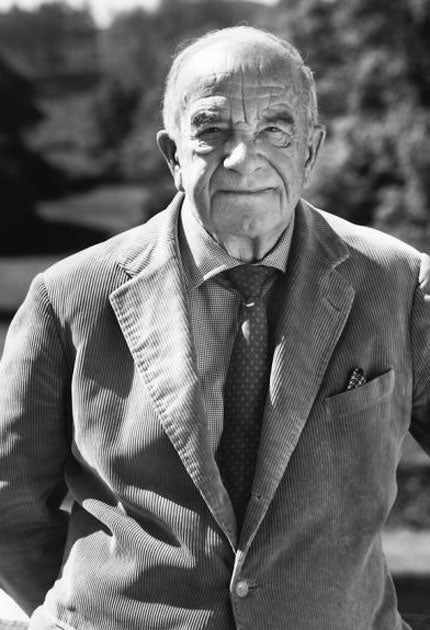Peter Scott: Businessman and philanthropist devoted to the Lake District and the North-west

The death of Peter Scott has robbed the Lake District of one of its most august citizens. Amid a successful career building up the Provincial into one of the largest privately-owned insurance firms in the country, he never lost his love of social philanthropy. As such, heading up the family's many charitable outlets, few people have made such a distinctive contribution to their local communities.
Educated first at Winchester, he followed his uncle and father to Oriel College, Oxford. Like so many of his generation, his seemingly effortless progress was rudely interrupted by the Second World War. Spending seven years in uniform, he served with 21st Army Group in North West Europe, joined the 8th Army on their push through North Africa, Sicily and Italy, before promotion to Captain brought command of 1st Battalion of the King's Royal Rifle Corps.
Demobbed in 1946, Scott returned to join the family business, Provincial Insurance Company Ltd. Though it was founded in 1903 by his grandfather, it was Scott's father, Francis, ably advised by the celebrated economist John Maynard Keynes, who, during the inter-war years, had dramatically driven the business forward.
Based since 1919 at Sand Aire House, Kendal, one of Peter Scott's first tasks on joining was to oversee the construction of the modernist office block which has long been such a distinctive feature of the town's skyline. Scott served as a director for 31 years; in 1957, he took on the seemingly impossible task of succeeding his father as chairman. Like him, an assiduous administrator with an ordered mind and a particularly keen eye for detail, he was also a stickler for punctuality, and could be equally impatient with anything less than perfection. Eventually stepping down from the day-to-day running of the business in 1977, when elected president, he stayed with the company until it was sold in 1994.
Concern for the welfare of its employees had long been a hallmark of the Provincial's ethos. In addition, its considerable profits were used to finance a wide range of charitable causes. Money for these was channelled through family funds, the most notable perhaps being the Francis Scott Charitable Trust. Set up in 1963 with Peter as chairman, over the decades it has supported many and varied activities throughout the North-west. In its first year of operation, it distributed five grants worth £6.000. In recent times, the annual average has exceeded £1.3m.
At its core lay Brathay Hall, a fine Georgian house in the heart of the Lake District, set amid 350 acres of countryside that sweeps down to the shores of Lake Windermere. It was purchased by Francis Scott in 1939; he saw it as a venue whereby many young people could enjoy the outdoors while learning self-reliance. Further developed by Peter Scott, today, though less dependant on the family, it continues to thrive.
In 1957 came the successful development of another Georgian property, this time the long derelict Abbot Hall in Kendal. It is now a museum and art gallery of national importance. Likewise, his drive and vision also proved pivotal in pushing forward the innovative concept of the Brewery Arts Centre, located on the nearby High Street. Opened in 1972, this is now a popular multi-functional performance venue. Other organisations benefiting have included the Kendal Museum of Natural History, the Lake District National History Gallery, the World Wild Life Gallery and the Stott Park Bobbin Mill, a restored workshop for making cotton reels, an atmospheric reminder of the heyday of the Lancashire cotton industry.
An Executive Member of Northern Arts Association and a former Deputy Lieutenant of Cumbria, he also served as Chairman of the Lake District Committee of the National Trust and on the Northern Economic Development Council. In recent years he inhabited a more national landscape, his broad cultural outlook finding an outlet in his membership of the National Standing Committee on Museums and Art galleries and as a Director of the Executive Committee of the National Theatre. While the most convivial and charming of companions, he remained essentially private, eschewing publicity and perhaps most at ease amid family or a tightly-knit circle of friends.
Closely associated with the University of Lancaster since its inception in 1964, he became the first Chairman of its Finance Committee. It was through his generosity that here the Peter Scott Gallery was established in 1988. Playing permanent host to the pictures and prints of the Manton Bequest as well as the John Chambers Collection of Pilkington's Lancashire Ware, the venue now serves as a fitting monument, not only to a highly successful businessman and generous benefactor but, more importantly, to a most delightful human being.
Peter Francis Scott, businessman and philanthropist: born Kendal, Cumbria 21 September 1917; High Sheriff of Westmorland 1963; CBE 1982; married 1953 Prudence Milligan (marriage dissolved 1974; one son, three daughters); died London 13 November 2010.
Subscribe to Independent Premium to bookmark this article
Want to bookmark your favourite articles and stories to read or reference later? Start your Independent Premium subscription today.

Join our commenting forum
Join thought-provoking conversations, follow other Independent readers and see their replies